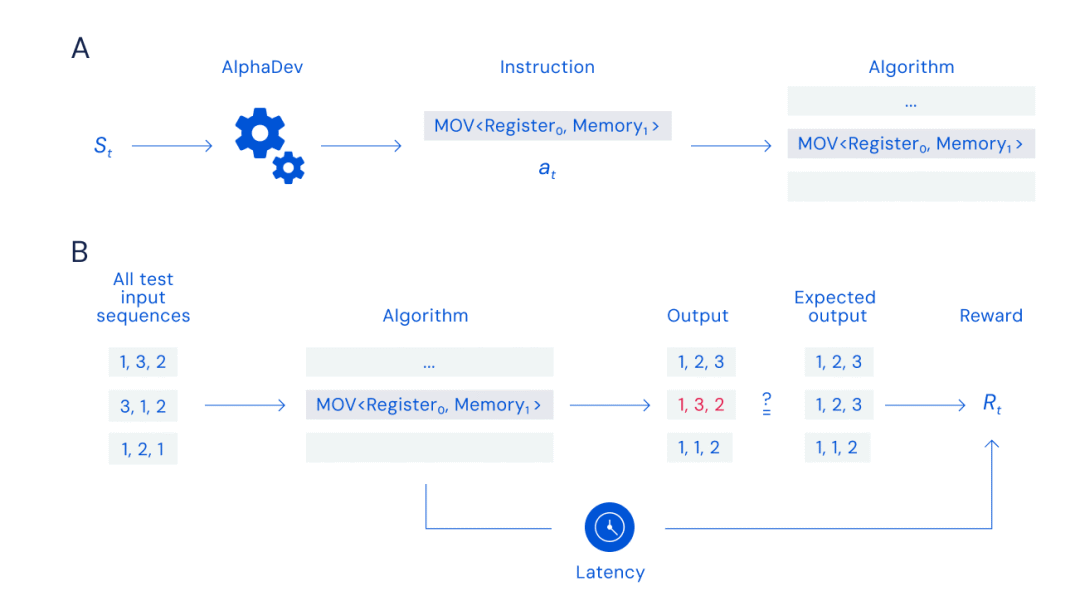
How to use Python for selection sort
Selection sort is a simple but less efficient sorting algorithm. Its basic idea is to select the smallest (or largest) element from the data to be sorted each time and place it at the end of the sorted sequence. Repeat this process multiple times until all data is sorted.
The following will introduce in detail how to use Python for selection sorting and provide specific code examples.
- First, define a selection sort function, named selection_sort, which accepts a list to be sorted as a parameter.
def selection_sort(lst):
n = len(lst)
for i in range(n-1):
min_index = i # 记录当前最小值的索引
for j in range(i+1, n):
if lst[j] < lst[min_index]:
min_index = j
lst[i], lst[min_index] = lst[min_index], lst[i] # 将最小值交换到已排序序列的末尾- Call the selection_sort function in the main program and pass in the list to be sorted. The following is an example:
lst = [64, 25, 12, 22, 11]
selection_sort(lst)
print("排序后的列表:", lst)The output result is:
排序后的列表: [11, 12, 22, 25, 64]
The above is a specific code example of using Python for selection sorting. The execution of the code is further explained below.
In selection sorting, we implement it through two levels of loops. The outer loop controls the starting position of selecting the smallest element from the unsorted subsequence each time, while the inner loop is used to find the smallest element in the current unsorted subsequence. By comparing the current element with the smallest element that has been selected, we can get the index of the smallest element in the subsequence.
After finding the smallest element, we swap it with the last element of the sorted sequence, so that the smallest element is placed at the end of the sorted sequence. By repeating this process, each time selecting the smallest element and placing it at the end of the sorted sequence, we end up with an ordered list.
It should be noted that the time complexity of selection sort is O(n^2), where n is the number of elements to be sorted. Although its efficiency is relatively low, selection sort is still a simple and easy-to-implement sorting algorithm when the data size is small.
I hope the above content will help you understand and use Python for selection sorting. If you have any other questions, please ask.
The above is the detailed content of A guide to implementing selection sort in Python. For more information, please follow other related articles on the PHP Chinese website!
 Python中的残差分析技巧Jun 10, 2023 am 08:52 AM
Python中的残差分析技巧Jun 10, 2023 am 08:52 AMPython是一种广泛使用的编程语言,其强大的数据分析和可视化功能使其成为数据科学家和机器学习工程师的首选工具之一。在这些应用中,残差分析是一种常见的技术,用于评估模型的准确性和识别任何模型偏差。在本文中,我们将介绍Python中使用残差分析技巧的几种方法。理解残差在介绍Python中的残差分析技巧之前,让我们先了解什么是残差。在统计学中,残差是实际观测值与
 AssertionError:如何解决Python断言错误?Jun 25, 2023 pm 11:07 PM
AssertionError:如何解决Python断言错误?Jun 25, 2023 pm 11:07 PMPython中的断言(assert)是程序员用于调试代码的一种有用工具。它用于验证程序的内部状态是否满足预期,并在这些条件为假时引发一个断言错误(AssertionError)。在开发过程中,测试和调试阶段都使用断言来检查代码的状态和预期结果是否相符。本文将讨论AssertionError的原因、解决方法以及如何在代码中正确使用断言。断言错误的原因断言错误通
 快手双边市场的复杂实验设计问题Apr 15, 2023 pm 07:40 PM
快手双边市场的复杂实验设计问题Apr 15, 2023 pm 07:40 PM一、问题背景1、双边市场实验介绍双边市场,即平台,包含生产者与消费者两方参与者,双方相互促进。比如快手有视频的生产者,视频的消费者,两种身份可能存在一定程度重合。双边实验是在生产者和消费者端组合分组的实验方式。双边实验具有以下优点:(1)可以同时检测新策略对两方面的影响,例如产品DAU和上传作品人数变化。双边平台往往有跨边网络效应,读者越多,作者越活跃,作者越活跃,读者也会跟着增加。(2)可以检测效果溢出和转移。(3)帮助我们更好得理解作用的机制,AB实验本身不能告诉我们原因和结果之间的关系,只
 Python中的分层抽样技巧Jun 10, 2023 pm 10:40 PM
Python中的分层抽样技巧Jun 10, 2023 pm 10:40 PMPython中的分层抽样技巧抽样是统计学中常用的一种数据采集方法,它可以从数据集中选择一部分样本进行分析,以此推断出整个数据集的特征。在大数据时代,数据量巨大,使用全样本进行分析既耗费时间又不够经济实际。因此,选择合适的抽样方法可以提高数据分析效率。本文主要介绍Python中的分层抽样技巧。什么是分层抽样?在抽样中,分层抽样(stratifiedsampl
 如何在Python中使用支持向量聚类技术?Jun 06, 2023 am 08:00 AM
如何在Python中使用支持向量聚类技术?Jun 06, 2023 am 08:00 AM支持向量聚类(SupportVectorClustering,SVC)是一种基于支持向量机(SupportVectorMachine,SVM)的非监督学习算法,能够在无标签数据集中实现聚类。Python是一种流行的编程语言,具有丰富的机器学习库和工具包。本文将介绍如何在Python中使用支持向量聚类技术。一、支持向量聚类的原理SVC基于一组支持向
 谷歌借AI打破十年排序算法封印,每天被执行数万亿次,网友却说是最不切实际的研究?Jun 22, 2023 pm 09:18 PM
谷歌借AI打破十年排序算法封印,每天被执行数万亿次,网友却说是最不切实际的研究?Jun 22, 2023 pm 09:18 PM整理|核子可乐,褚杏娟接触过基础计算机科学课程的朋友们,肯定都曾亲自动手设计排序算法——也就是借助代码将无序列表中的各个条目按升序或降序方式重新排列。这是个有趣的挑战,可行的操作方法也多种多样。人们曾投入大量时间探索如何更高效地完成排序任务。作为一项基础操作,大多数编程语言的标准库中都内置有排序算法。世界各地的代码库中使用了许多不同的排序技术和算法来在线组织大量数据,但至少就与LLVM编译器配套使用的C++库而言,排序代码已经有十多年没有任何变化了。近日,谷歌DeepMindAI小组如今开发出一
 Python中的因子分析技巧Jun 11, 2023 pm 07:33 PM
Python中的因子分析技巧Jun 11, 2023 pm 07:33 PM因子分析是一种非监督学习的统计学方法,用于分析多个变量间的关系,并找出影响这些变量的潜在因素。Python中有多种因子分析的技巧和库可供使用,本文将介绍其中的几种技巧。一、主成分分析(PCA)主成分分析(PCA)是因子分析的一种方法,它可以将一个高维数据集转化为一个低维子空间。PCA可用于降低噪声或冗余变量的影响,同时保留数据集中最重要的信息。在Python
 Python中的时间序列预测技巧Jun 10, 2023 am 08:10 AM
Python中的时间序列预测技巧Jun 10, 2023 am 08:10 AM随着数据时代的到来,越来越多的数据被收集并用于分析和预测。时间序列数据是一种常见的数据类型,它包含了基于时间的一连串数据。用于预测这类数据的方法被称为时间序列预测技术。Python是一种十分流行的编程语言,拥有强大的数据科学和机器学习支持,因此它也是一种非常适合进行时间序列预测的工具。本文将介绍Python中一些常用的时间序列预测技巧,并提供一些在实际项目中


Hot AI Tools

Undresser.AI Undress
AI-powered app for creating realistic nude photos

AI Clothes Remover
Online AI tool for removing clothes from photos.

Undress AI Tool
Undress images for free

Clothoff.io
AI clothes remover

AI Hentai Generator
Generate AI Hentai for free.

Hot Article

Hot Tools

DVWA
Damn Vulnerable Web App (DVWA) is a PHP/MySQL web application that is very vulnerable. Its main goals are to be an aid for security professionals to test their skills and tools in a legal environment, to help web developers better understand the process of securing web applications, and to help teachers/students teach/learn in a classroom environment Web application security. The goal of DVWA is to practice some of the most common web vulnerabilities through a simple and straightforward interface, with varying degrees of difficulty. Please note that this software

SublimeText3 Mac version
God-level code editing software (SublimeText3)

PhpStorm Mac version
The latest (2018.2.1) professional PHP integrated development tool

Safe Exam Browser
Safe Exam Browser is a secure browser environment for taking online exams securely. This software turns any computer into a secure workstation. It controls access to any utility and prevents students from using unauthorized resources.

Zend Studio 13.0.1
Powerful PHP integrated development environment






